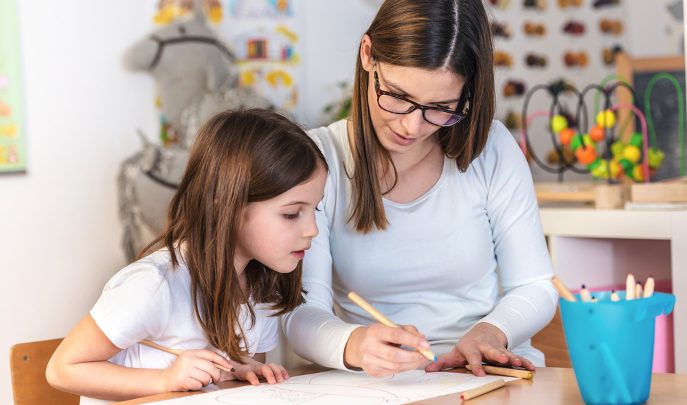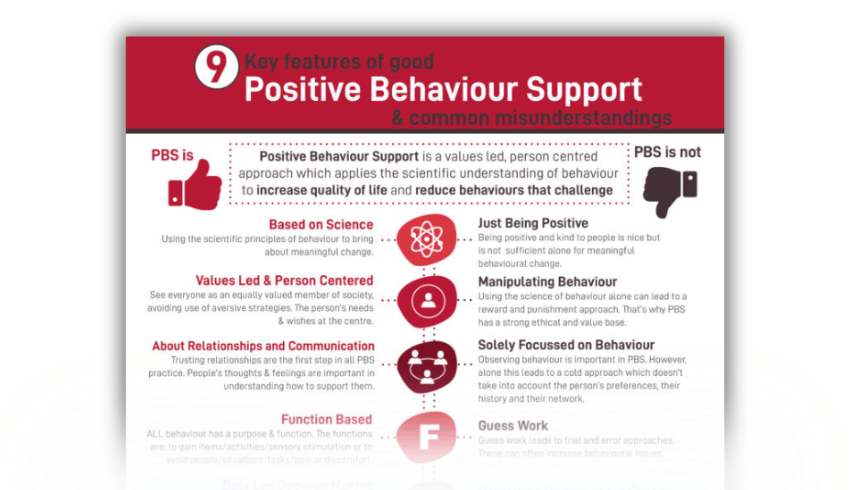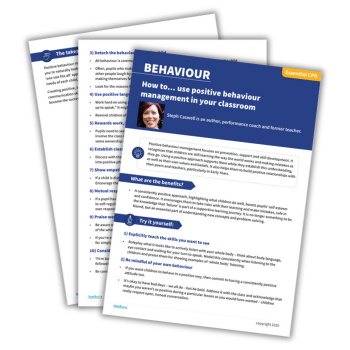PDF teacher guide and PDF poster
KS1, KS2
Years 1-6
Positive behaviour support focuses on prevention, management and skill development. This PDF guide features ten ideas for using it in your classroom.
Positive behaviour support recognises that children are still learning the way the world works and making mistakes as they go. Using this approach helps pupils establish this understanding, as well as their own values and beliefs.
Positive behaviour support also helps children to build positive relationships with their peers and teachers.
What are the benefits of positive behaviour support?
A consistently positive approach, highlighting what children do well, boosts pupils’ self-esteem and confidence.
It encourages them to take risks with their learning and make mistakes, safe in the knowledge that ‘failure’ is part of a supportive learning journey. It is no longer something to be feared, but an essential part of understanding new concepts and problem-solving.
This guide covers the following points:
- Explicitly teaching the skills you want to see
- Being mindful of your own behaviour
- Detaching the behaviour from the child
- Using positive language to remind children of your expectations
- Rewards that your class will value
- Establishing class values
- Showing empathy
- Developing mutual respect
- Praise and reprimands
Steph Caswell is an author, performance coach and former teacher. Follow her on Twitter at @stephcaswell_.
Why it’s about building relationships

Positive behaviour support isn’t about trying to reduce ‘challenging’ behaviours. It’s a proactive approach to promote and reinforce new skills that lead to appropriate ones, explains clinical psychologist Kate Strutt…
Discussions on social media around education are always an interesting experience. There are lots of issues raised around the use of punishments, exclusions and ‘management of behaviour’.
Most shockingly was a post that analysed exclusions from schools to find that a very high proportion of these within the UK were from specialist schools.

In some cases, I suspect that this isn’t about the use of punishment as a way of reducing behaviour issues. Instead, it’s more about the removal of a child either temporarily or permanently from schools which don’t know how to support or educate them. Parent comments on social media are often heartbreaking concerning this.
During the last five years of my career as a clinical psychologist, I have specialised in positive behaviour support. Initially this was in adult services for people with disabilities but increasingly also in children’s disability services and schools.
What is surprising is that despite a developing evidence base from the late 1980s (Sailor et al 2009) many schools and children’s services’ knowledge of positive behaviour support is almost non-existent. Or because the approach includes the words ‘behaviour support’ there’s an assumption that ‘we are already doing this’.
I make no judgement about this as I was guilty of it myself a few years ago, but this needs to change. Thankfully, positive behaviour support was mentioned in the Lenehan review of services for children and young people with complex needs.
What is and what is not positive behaviour support ?
Positive behaviour support is an approach for understanding the reasons behind behaviours that challenge, commonly called the ‘function’.
Positive behaviour support interventions add in appropriate support and teach new skills. The aim is to increase a person’s quality of life through increasing access to opportunities or development of new skills. By doing so you reduce the need for behaviours that challenge.
Positive behaviour support is…
- Primarily focused on proactive approaches. Interventions are put in place when behaviours that challenge are not occurring.
- A scientific understanding of behaviour to encourage and motivate and to reduce inadvertent reinforcement of behaviours that challenge.
- An approach that only uses interventions which change/enrich the environment or add skills/opportunities.
- An approach which uses complex behavioural techniques to promote and reinforce new skills which lead to appropriate behaviours.
Positive behaviour support is not…
- A set of reactive strategies for managing behaviours that challenge when they occur.
- A behaviour management approach which uses rewards to manipulate behaviour so that behaviour becomes ‘good’.
- A behaviour management approach which uses punishment techniques. This includes anything that would focus primarily on reducing a behaviour rather than increasing an appropriate alternative as well as actions pupils would find aversive.
- Just about being nice and kind to people with disabilities in the absence of a clear plan to improve quality of life.
Rewards and punishments
The use of rewards and punishment across schools is widespread. Seeing the effects of this on many children, there is a significant backlash against ‘a behavioural approach’. Instead, there’s a move towards ideas from authors such as Alfie Kohn’s (1999).
As the parent of a child with dyslexia who has massively struggled at school, I can understand this. When my child avoids doing work in class by repeatedly going to the toilet, is he behaving in a naughty way/being lazy and should therefore be punished?
Should the teacher reward him for sitting in his seat or staying in the classroom for a specific amount of time? Or is he using the best strategy he knows to reduce his stress levels?
From a positive behaviour support point of view the intervention is not to punish ‘out-of-seat behaviour’ or even reward ‘in-seat behaviour’. Instead, it’s to look at the task and the level of support he is getting and make changes there.
Throwing the behavioural model out because of inappropriate or ineffective applications does a massive disservice to the many children who can benefit from positive behaviour support, especially those with significant disabilities.
Social praise
Without the scientific understanding of behaviour which forms the basis of positive behaviour support we are at a loss as to how to approach some of the most challenging behaviours. Without understanding that escaping from the demands of a task strengthens a behaviour we may inadvertently increase the behaviour by using ‘time out’.
Instead, we can break up the task into small manageable parts and use social praise (‘well done!’) to celebrate and encourage success, which creates a scaffold for the new skill.
Then, the child can eventually access the intrinsic pleasure of completing the maths problem or being able to put on their shoes. Without this, the child might have avoided these tasks as they were too hard or too confusing.
Relationships
I see lots of discussions on social media about the importance of relationships in the context of schools, teaching and support to pupils with SEND. Sometimes these discussions include reference to using either a behavioural approach or a relationship-based approach.
However, a quote I saw recently makes the point well, for whichever approach is being used:
“They’ve got to like the messenger if they’re going to listen to the message”
The debate about the use of punishments is really key to this. Positive behaviour support does not use any punishment approaches which aim to reduce behaviours or any aversive strategies.
Behavioural science tells us that the side effect of punishment is that the punisher becomes associated with the punishment. When this happens, trust is gone. And so is the potential for you to support the young person with her development.
I spend a lot of time helping staff teams who are supporting young people with very frequent and intense behavioural challenges to associate themselves with ‘good stuff’ and to be nice to be around by doing fun things.
In these situations, the person, who may have been through very difficult times, including multiple restraints or seclusions, does not trust people in their environment, and this is what we are building; trust.
The same principle applies when children with disabilities find something about the school environment difficult and as a result present with challenging behaviours. We do not get off first base until that person develops trust and likes the people around him.
Relationships are the foundation of positive behaviour support interventions.
Questions to consider
Is your school’s behaviour policy:
- Too generic? Does it meet the needs of your population of children?
- Based on an inappropriate or outdated behavioural model?
What does your practice around behaviours that challenge look like? Is it:
- Primarily based on reactive approaches?
- Using practices and systems for developing new skills and opportunities for children who are experiencing restrictions?
- Providing the necessary expertise to help you implement positive behaviour support?
Kate Strutt is the director of Redstone (@redstonepsychol) and a clinical psychologist with over 19 years’ experience of working in intellectual disability and autism services, both within statutory services and the independent sector. She is also a member of the British Psychological Society and is registered with the Health and Care Professions Council.
Read more behaviour management advice for early years, primary and secondary.











